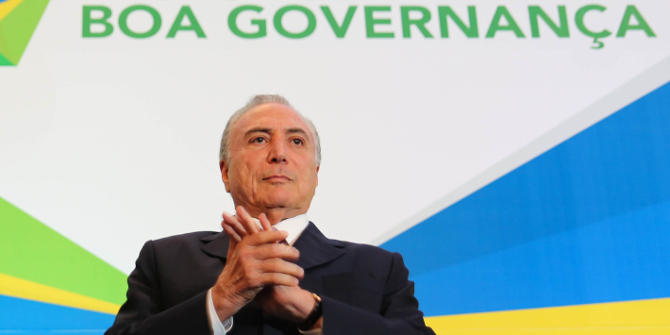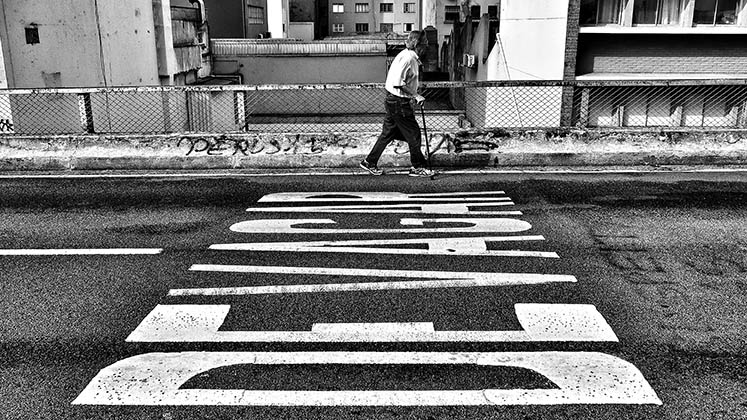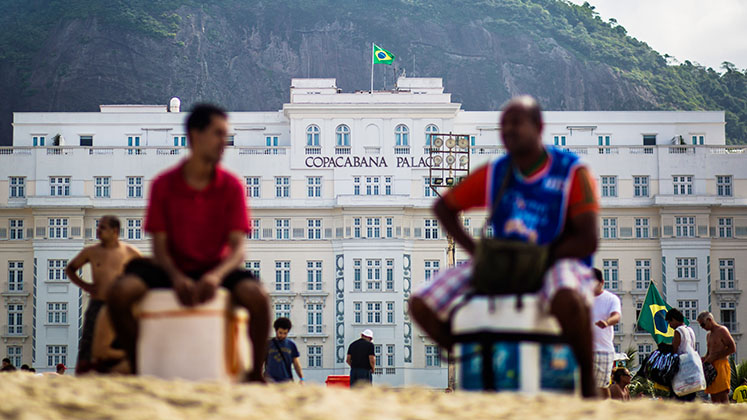 With the Argentine parliament already debating a one-off tax on its wealthiest citizens, OXFAM last month published a report showing that the richest 1% of the global population do twice as much damage to the climate as the poorest 50%. So are elites part of the problem or part of the solution? Simply saying that global warming is everybody’s fault just lets those who are really responsible off the hook, writes Mauro Fernández (Atlantic Fellows for Social and Economic Equity).
With the Argentine parliament already debating a one-off tax on its wealthiest citizens, OXFAM last month published a report showing that the richest 1% of the global population do twice as much damage to the climate as the poorest 50%. So are elites part of the problem or part of the solution? Simply saying that global warming is everybody’s fault just lets those who are really responsible off the hook, writes Mauro Fernández (Atlantic Fellows for Social and Economic Equity).
• Disponible también en español
After months of internal discussion, Argentina’s ruling Frente de Todos party (Front for Everyone) introduced a bill that would submit the largest fortunes in the country to a special one-off tax. In its original form, the bill aimed to bring in revenues worth around 1% of GDP, half of which would come from just 253 people (based on Federal Administration of Public Income figures from the close of 2019). Working from these data, the charge would be levied on some 9298 fortunes with a declared value of over 200 million pesos (roughly USD$2.5 million at the current exchange rate). This represents 0.02% of the population.
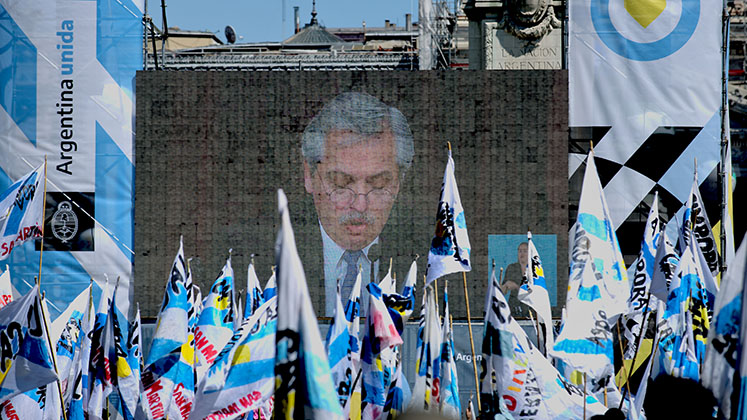
However, debate in the National Congress is already revisiting both the quantity and the scope of the measure, meaning that the total value in terms of revenue is likely to be smaller. This levy, considered a one-off, aims to pay for just a tiny fraction of the economic recovery that will be needed if the country’s COVID-induced crash proves to be as bad as predicted.
COVID-19 and the 1% in Argentina
According to estimates from the UN Economic Commission for Latin America and the Caribbean (ECLAC), Argentina’s GDP will fall by around 10.5% this year. This collapse will be accompanied by one of the region’s highest jumps in income inequality, similar to those seen in Ecuador and Peru. ECLAC’s analysis only takes into account employment income, which means that special measures taken by the government to shift resources towards the most vulnerable sectors should reduce this gap somewhat.
The Argentine state is currently assisting 21 million people – almost half of the total population – through policies like the Emergency Federal Income, the Work and Production Allowance, and the Universal Child Allowance. Aside from being insufficient, this minimal level of assistance serves only to prevent the large-scale social crisis that could result from the COVID-driven realisation that inequality is not just about imbalances in consumption but also in chances of survival.
Whether seen as an issue of fairness or finances, it seems both reasonable and necessary that the country’s richest 0.02% should make a contribution amounting to a maximum of 3.5% of their total wealth. Then again, to really see the bigger picture we need to zoom out a little further and ask what the most privileged elites really contribute on a global scale.
Climate change and the 1%
The latest climate change report from OXFAM reveals that between 1990 and 2015 the wealthiest 1% of the global population were responsible for emitting twice as much carbon as the poorest 50%. This inequality of emissions – the same emissions driving the climate crisis – is so great that the richest 10% of the global population would use up our entire carbon budget by 2033 even if the rest of us reduced our emissions to zero. The carbon budget is the maximum permissible level of carbon emissions if we are to avoid going beyond a 1.5 ºC rise in global temperatures, which was the key goal of the Paris Agreement of 2015.
The data revealed by OXFAM show that it is mainly elites that have caused the environmental and ecological catastrophe that we all now face. But the question of liability for this crisis is also historical, and it needs to be analysed from various angles: the countries and corporations with the highest emissions (the US, the EU, China), the sectors most damaging to the climate (fossil fuels, deforestation for meat production), and also the elites in charge (whose flag tends to fly in the world’s stock exchanges rather than in the halls of government).

Simply saying that global warming is everybody’s problem amounts to letting those who are really responsible off the hook. But we also have to be careful: Argentina, like various other middle-income countries, finds itself amongst the top 30 states in terms of per-capita emissions, with each individual Argentine emitting just as much as each European. Fossil fuels also make up nearly 90% of Argentina’s energy matrix, which is one of the highest levels in the region.
But even as the need for decarbonisation becomes ever clearer, economic plans from across the political spectrum continue to focus on increased extraction and export of hydrocarbons with the help of the same multinational corporations that bear the greatest historical responsibility for climate change.
The global shift towards a green recovery
But how does the rest of the world compare?
European Commission President Ursula von der Leyen has recently said that within ten years the bloc will have reduced its emissions by “at least 55%” compared to 1990 levels. This goes beyond the current commitment of 40% and more accurately reflects what will be required of Europe if the world is to avoid going 1.5 ºC above pre-industrial global temperatures, as stipulated by the Paris Agreement. What is more, 30% of the €750 billion assigned to post-pandemic reconstruction within the EU will be spent on measures to prevent climate change. In the United States, the Democratic presidential candidate, Joe Biden, has promised to invest USD$2 trillion to decarbonise the economy.
The US and Europe are icons of the Western market ideal, the main winners from the Industrial Revolution, and the regions most responsible for today’s climate crisis. The nature of this huge shift in emphasis is a sign of the scale and direction of movement for these major economies, but the transition does not end there. The President of China, Xi Jinping, opened the most recent meeting of the United Nations General Assembly with a commitment to hit peak emissions before 2030 and become carbon neutral by 2060. Coming from the world’s second largest economy and largest carbon emitter, this sends a very strong signal to the rest of us.
But rather than looking at these moves as models to follow, it would be more worthwhile to weigh up how they will affect the global economy, and especially imports from the Global South. If the “North” stops investing in fossil fuels and starts to finance a transition to renewables, will we still be able to turn a profit from our gas and oil infrastructure projects? Can we envisage a globalised post-fossil society before the end of the century? And can we see this as an opportunity to be seized rather than a trial to be endured?
To get a sense of the scale of the historical plunder of Latin America, it is worth remembering that fully one hundred million kilograms of silver were shipped to Europe between the 16th and 19th centuries. According to calculations by the anthropologist Jason Hickel, if that precious metal had been invested in 1800 at an annual interest rate of 5%, today we would be talking about USD$165 trillion, which is twice the value of today’s global economy. So how much did Latin America really get? Figures from ECLAC and the World Bank show that the region of Latin America and the Caribbean accounted for just 6.57% of global GDP in 2019.
So why do our governments, be they progressive or neoliberal, persist with the idea that exporting primary goods from the South to the North will bring us prosperity? Should we not instead be challenging the very idea of boundless GDP growth and coming up with redistributive metrics that end our social divisions and our dependence on fossil fuels and industrial agriculture? Neither should we forget that even the parts of the world that are already investing in other technologies will soon be undergoing a crisis as bad as anything we’ve seen in the last 90 years at least.
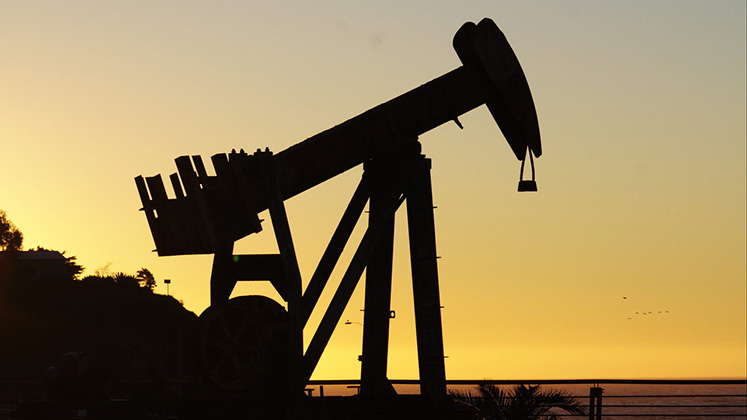
What needs to change?
In a 21st century that is already proving to be exceptional, it’s time for a rethink. Reimagining North-South dynamics from a decolonial perspective will allow us to undertake an energy and food transition that can also include the millions left behind by the current global system. But to do that, our analysis will need to incorporate many different issues, and especially the two most pressing ones: inequality and ecological collapse. In essence, we need to find the formula for deep inclusion within our environmental limits.
With this in mind, it’s worth remembering that even if 75% of the revenue raised by Argentina’s new levy on large fortunes will support public health, production, housing, and education, the remaining 25% will go towards exploration, development, and production of natural gas (carried out exclusively by state energy company YPF).
To reiterate, a quarter of the money raised by a one-off, redistributive levy implemented during a health crisis caused by a zoonotic virus will be used to subsidise the extraction of the same fossil fuels responsible for the ecological crisis we’re already facing.
According to data from Argentina’s Environment and Natural Resource Foundation (FARN), fossil-fuel subsidies made up 5% of the national budget in 2019, which is the equivalent of 15 million Universal Child Allowances (AUH). Some 47% of the total outlay went to Tecpetrol, the petroleum company owned by Paolo Rocca, whose fortune of USD$3.4 billion makes him the third richest man in the country, according to Forbes magazine. It isn’t just that he isn’t contributing; he’s actually taking astronomical sums via subsidies. And when the IMF asks for these subsidies to be cut, he turns to the courts to extort money from the state.
Going back to the data from FARN, if Rocca hadn’t received this contribution from the state, almost 7.5 million Argentine citizens would have been able to receive an allowance equivalent to the AUH. Should it be a priority for the state to keep subsiding fossil fuels? The pandemic would seem to have shown that it’s time to reshape public spending around redistribution and access to basic rights, but without going beyond our environmental limits. This is the basic balance that can guarantee our survival.
Elites receive public subsidies to keep their businesses profitable, passing on the risks and the economic, social, and environmental damage to the rest of the population. For the most part, these businesses are in the same industries that produce ecological crises. And irrespective of the overall fiscal contribution provided by the corporations that they partially or fully own, the elites are also personally responsible for most of the emissions that generate these disasters.
But despite all of that, faced with the possibility of a one-off contribution, even one that seems tiny given the gravity of the situation, they defend themselves ferociously. The greed of elites and of the political spaces in which they operate is laid bare by how desperately this 0.02% of the population clings to every last millimetre of its privilege.
The diminishing returns of neoliberal logics
There are also those that still think we need private investment to generate employment, trickle-down, and the whole neoliberal rationale whose natural endpoint is the combination of outrageous inequality and terminal ecological crisis that we face today. The winners from this system, however, see it somewhat differently.
In a controversial TED Talk from 2012, Amazon co-founder Nick Hanauer noted: “I can assure you that we the wealthy don’t create jobs; jobs are created by the virtuous circle between businesses and customers that comes about when consumers raise demand.” He said plainly that “the average consumer is more of a job creator than a capitalist [like myself]”. And he finished off by criticising fiscal policies that favour huge wealth: “When massive exemptions and low tax rates are made to favour the wealthy in the name of job creation, all that ends up happening is that the rich get richer.”
There’s no doubt that the rich are already making a contribution. They contribute a lot. But it’s mainly social and environmental disasters. Isn’t it time that they gave something back, even if it’s just a painless little slice of what they have left over? Isn’t it time they stopped giving us crises and started providing solutions?
Notes:
• The views expressed here are of the authors rather than the Centre or the LSE
• Follow the author on Twitter at: @mnfernandez
• This is an edited version of an article originally published in Anfibia
• Translation by Asa Cusack
• Please read our Comments Policy before commenting


